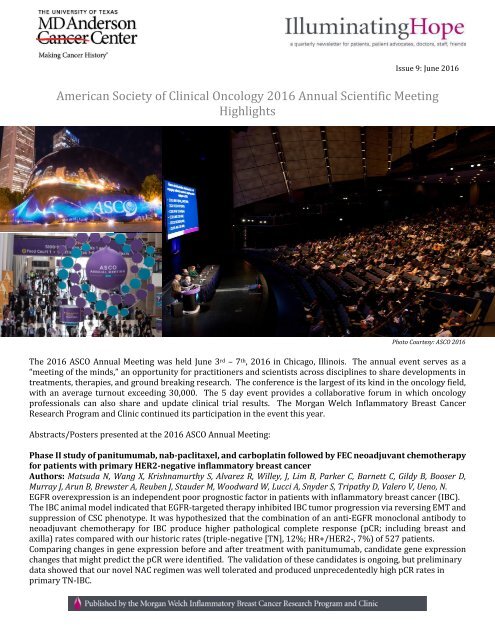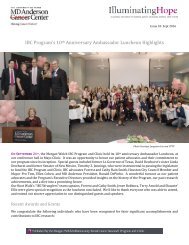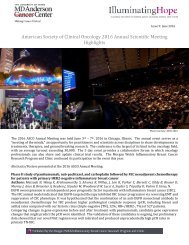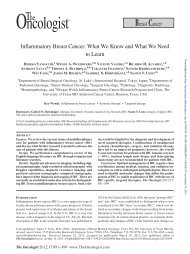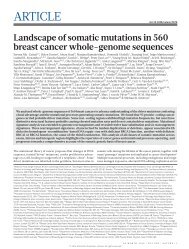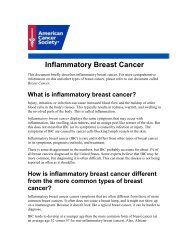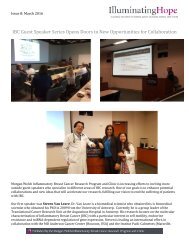Iluminating Hope - The Newsletter of the MD Anderson Morgan Welch IBC Research Program and Clinic - Issue 9 June 2016
Create successful ePaper yourself
Turn your PDF publications into a flip-book with our unique Google optimized e-Paper software.
<strong>Issue</strong> 9: <strong>June</strong> <strong>2016</strong><br />
American Society <strong>of</strong> <strong>Clinic</strong>al Oncology <strong>2016</strong> Annual Scientific Meeting<br />
Highlights<br />
Photo Courtesy: ASCO <strong>2016</strong><br />
<strong>The</strong> <strong>2016</strong> ASCO Annual Meeting was held <strong>June</strong> 3 rd – 7 th , <strong>2016</strong> in Chicago, Illinois. <strong>The</strong> annual event serves as a<br />
“meeting <strong>of</strong> <strong>the</strong> minds,” an opportunity for practitioners <strong>and</strong> scientists across disciplines to share developments in<br />
treatments, <strong>the</strong>rapies, <strong>and</strong> ground breaking research. <strong>The</strong> conference is <strong>the</strong> largest <strong>of</strong> its kind in <strong>the</strong> oncology field,<br />
with an average turnout exceeding 30,000. <strong>The</strong> 5 day event provides a collaborative forum in which oncology<br />
pr<strong>of</strong>essionals can also share <strong>and</strong> update clinical trial results. <strong>The</strong> <strong>Morgan</strong> <strong>Welch</strong> Inflammatory Breast Cancer<br />
<strong>Research</strong> <strong>Program</strong> <strong>and</strong> <strong>Clinic</strong> continued its participation in <strong>the</strong> event this year.<br />
Abstracts/Posters presented at <strong>the</strong> <strong>2016</strong> ASCO Annual Meeting:<br />
Phase II study <strong>of</strong> panitumumab, nab-paclitaxel, <strong>and</strong> carboplatin followed by FEC neoadjuvant chemo<strong>the</strong>rapy<br />
for patients with primary HER2-negative inflammatory breast cancer<br />
Authors: Matsuda N, Wang X, Krishnamurthy S, Alvarez R, Willey, J, Lim B, Parker C, Barnett C, Gildy B, Booser D,<br />
Murray J, Arun B, Brewster A, Reuben J, Stauder M, Woodward W, Lucci A, Snyder S, Tripathy D, Valero V, Ueno, N.<br />
EGFR overexpression is an independent poor prognostic factor in patients with inflammatory breast cancer (<strong>IBC</strong>).<br />
<strong>The</strong> <strong>IBC</strong> animal model indicated that EGFR-targeted <strong>the</strong>rapy inhibited <strong>IBC</strong> tumor progression via reversing EMT <strong>and</strong><br />
suppression <strong>of</strong> CSC phenotype. It was hypo<strong>the</strong>sized that <strong>the</strong> combination <strong>of</strong> an anti-EGFR monoclonal antibody to<br />
neoadjuvant chemo<strong>the</strong>rapy for <strong>IBC</strong> produce higher pathological complete response (pCR; including breast <strong>and</strong><br />
axilla) rates compared with our historic rates (triple-negative [TN], 12%; HR+/HER2-, 7%) <strong>of</strong> 527 patients.<br />
Comparing changes in gene expression before <strong>and</strong> after treatment with panitumumab, c<strong>and</strong>idate gene expression<br />
changes that might predict <strong>the</strong> pCR were identified. <strong>The</strong> validation <strong>of</strong> <strong>the</strong>se c<strong>and</strong>idates is ongoing, but preliminary<br />
data showed that our novel NAC regimen was well tolerated <strong>and</strong> produced unprecedentedly high pCR rates in<br />
primary TN-<strong>IBC</strong>.
<strong>Issue</strong> 9: <strong>June</strong> <strong>2016</strong><br />
Open-label phase Ib study <strong>of</strong> entinostat (E), <strong>and</strong> lapatinib (L) alone, <strong>and</strong> in combination with trastuzumab<br />
(T) in patients (pts) with HER2+ metastatic (mHER2+) breast cancer after progression on trastuzumab<br />
Authors: Lim B, Murthy R, Jackson S, Willey J, Lee J, Alvarez R, Barcenas C, Ibrahim N, Karuturi M, Booser D, Moulder S,<br />
Giordano S, Brewster A, Walters R, Brown P, Tripathy D, Valero V, Ueno N.<br />
Maximum tolerated dose (MTD) was defined for Group 2 - Entinostat, lapatinib <strong>and</strong> trastuzumab combination.<br />
Entinostat 12mg every o<strong>the</strong>r week + lapatinib 1000mg daily + trastuzumab 8mg/kg to 6mg/kg q3 weekly was safe<br />
<strong>and</strong> well tolerated. Dose limiting toxicities included grade 3 <strong>and</strong> 4 hematologic toxicities, grade 3 diarrhea <strong>and</strong><br />
grade 4 hypokalemia. Prolonged disease control from this regimen was observed. <strong>The</strong>re was a trend toward longer<br />
progression-free survival for patients with <strong>IBC</strong> <strong>and</strong> previous lapatinib treatment, but <strong>the</strong> difference was not<br />
significant. Available data on CTC <strong>and</strong> signaling molecule markers do not show a relationship to outcome, but<br />
statistical power is limited. Phase II study in combination with a HER2 targeted agent should be explored as a<br />
<strong>the</strong>rapeutic option for metastatic trastuzumab-resistant HER2- positive breast cancer. A hypo<strong>the</strong>sis-oriented<br />
predictive biomarker development strategy: matched tissue <strong>and</strong> blood collection, preclinical data based marker<br />
testing plan is needed.<br />
Recent Awards <strong>and</strong> Grants<br />
We congratulate <strong>the</strong> following individuals who have been recognized for <strong>the</strong>ir significant accomplishments in <strong>IBC</strong><br />
research:<br />
Dr. Ge<strong>of</strong>frey Bartholomeusz, Associate Pr<strong>of</strong>essor (Experimental <strong>The</strong>rapeutics) received <strong>the</strong> <strong>2016</strong> AVON 39 – <strong>The</strong><br />
Walk to End Cancer award for his collaborative research with Drs. Bedrich Eckhardt, Naoto T Ueno, Savitri<br />
Krishnamurthy <strong>and</strong> Ms. Vidhu Sharma for "Developing ex-vivo tumor models <strong>of</strong> inflammatory breast cancer for<br />
drug testing.”<br />
Angie Marie Torres-Adorno, PhD C<strong>and</strong>idate, Breast Medical Oncology, was selected for <strong>the</strong> <strong>2016</strong> AACR<br />
Translational Cancer <strong>Research</strong> for Basic Scientists Workshop in Boston, based on her research projects aimed at<br />
treating aggressive types <strong>of</strong> breast cancer including <strong>IBC</strong> <strong>and</strong> TNBC. Mentor – Dr. Naoto T. Ueno.<br />
Dr. Sangeetha Reddy, <strong>Clinic</strong>al <strong>Research</strong> Fellow (Cancer Medicine - Fellowship <strong>Program</strong>) was named winner <strong>of</strong> <strong>the</strong><br />
“<strong>2016</strong> Young Investigator Award” from ASCO, for her research proposal on “Immune <strong>and</strong> molecular determinants <strong>of</strong><br />
response to neoadjuvant chemo<strong>the</strong>rapy in <strong>IBC</strong>”. In her research study, she will assess <strong>the</strong> influence <strong>of</strong> genomic<br />
factors on <strong>the</strong> <strong>IBC</strong> immune microenvironment, <strong>the</strong>reby revealing genomic <strong>and</strong> immune targets for developing<br />
treatment combinations with neoadjuvant chemo<strong>the</strong>rapy <strong>and</strong> immune targeted <strong>the</strong>rapy. Mentors – Drs. Jennifer<br />
Wargo <strong>and</strong> Naoto T. Ueno.<br />
Dr. Bisrat Debeb, Assistant Pr<strong>of</strong>essor (Radiation Oncology) received a 3 year Susan G. Komen grant for his research<br />
on early brain metastasis initiation <strong>and</strong> colonization from breast cancer using <strong>IBC</strong> cancer brain metastasis mouse<br />
models developed in our laboratory.<br />
During <strong>MD</strong> <strong>Anderson</strong>’s Education Week (May 23-27), Jay Paul Reddy, <strong>MD</strong>, PhD, <strong>Clinic</strong>al Postdoctoral Fellow,<br />
Radiation Oncology, received <strong>the</strong> Susan Papizan Dolan Fellowship in Breast Oncology. Mentor – Dr. Wendy<br />
Woodward.<br />
Dr. Bisrat Debeb, Assistant Pr<strong>of</strong>essor (Radiation Oncology) was named <strong>the</strong> recipient <strong>of</strong> a travel award for <strong>the</strong> <strong>2016</strong><br />
NCI CRCHD PACHE Investigators Workshop in Rockville, Maryl<strong>and</strong> for his abstract “LCN2 in inflammatory breast
<strong>Issue</strong> 9: <strong>June</strong> <strong>2016</strong><br />
cancer tumorigenesis <strong>and</strong> metastasis”.<br />
Dr. Ch<strong>and</strong>ra Bartholomeusz, Assistant Pr<strong>of</strong>essor (Breast Medical Oncology) was awarded <strong>the</strong> Institutional<br />
<strong>Research</strong> Grant for “Overcoming MEK-inhibitor resistance in TNBC by targeting Mcl-1, anti-apoptotic protein.” Her<br />
research using <strong>IBC</strong> cell lines holds promise in identifying <strong>the</strong>rapeutic targets for <strong>IBC</strong>.<br />
Recent Publications<br />
miR-141-Mediated Regulation <strong>of</strong> Brain Metastasis From Breast Cancer<br />
Bisrat G. Debeb, Lara Lacerda, Simone Anfossi, Parmeswaran Diagaradjane, Khoi Chu, Arvind Bambhroliya, Lei Huo,<br />
Caimiao Wei, Richard A. Larson, Adam R. Wolfe, Wei Xu, Daniel L. Smith, Li Li, Cristina Ivan, Pamela K. Allen, Wenhui<br />
Wu, George A. Calin, Savitri Krishnamurthy, Xiang H. Zhang, Thomas A. Buchholz, Naoto T. Ueno, James M. Reuben,<br />
Wendy A. Woodward<br />
About 15% to 30% <strong>of</strong> patients with advanced breast cancer develop brain metastases <strong>of</strong> which triple-negative <strong>and</strong><br />
human epidermal growth factor receptor 2 (HER2)–overexpressing cancers are disproportionately represented.<br />
Despite major advances in treatment <strong>of</strong> primary breast cancer <strong>and</strong> systemic malignancies, <strong>the</strong> prognosis for patients<br />
with brain metastases remains dismal, with median survival times ranging from five weeks without treatment to six<br />
months with multimodality treatment. Also, <strong>the</strong> incidence <strong>of</strong> brain metastases is increasing with <strong>the</strong> advent <strong>of</strong><br />
effective targeted systemic <strong>the</strong>rapies for breast cancer such as trastuzumab. Despite <strong>the</strong> substantial clinical need,<br />
<strong>the</strong> molecular basis for brain metastasis is still poorly understood.<br />
Herein, we developed <strong>and</strong> characterized novel brain metastasis mouse models <strong>and</strong> investigated <strong>the</strong> potential role <strong>of</strong><br />
miR-141 in brain metastatic colonization <strong>of</strong> breast cancer cells. <strong>The</strong> study suggests miR-141 is a regulator <strong>of</strong> brain<br />
metastasis from breast cancer <strong>and</strong> should be examined as a biomarker <strong>and</strong> potential target to prevent <strong>and</strong> treat brain<br />
metastases.<br />
Histone deacetylase inhibitor-induced cancer stem cells exhibit high pentose phosphate pathway<br />
metabolism<br />
Bisrat G. Debeb, Lara Lacerda, Richard Larson, Adam R. Wolfe1,5, Savitri Krishnamurthy, James M. Reuben, Naoto T.<br />
Ueno, Michael Gilcrease, Wendy A. Woodward<br />
Through this study, it was demonstrated that histone deacetylase (HDAC) inhibitors can “reprogram” differentiated<br />
triple-negative breast cancer cells to become quiescent stem-like cancer cells. We hypo<strong>the</strong>sized that <strong>the</strong> metabolic<br />
state <strong>of</strong> such cells differs from that <strong>of</strong> <strong>the</strong>ir differentiated progeny. In untreated cells, glucose uptake was higher in<br />
ALDH + cells than in ALDH – cells (p = 0.01) but lactate production was not different; treating ALDH – or ALDH + cells<br />
with VA or SAHA similarly increased glucose uptake without changing lactate production but upregulated G6PD, a<br />
rate-limiting enzyme in pentose phosphate pathway metabolism. NADPH production was higher in HDAC inhibitortreated<br />
stem-like cells than in vehicle-treated cells (p < 0.05). Two G6PD inhibitors, 6-aminonicotinamide <strong>and</strong><br />
dehydroepi<strong>and</strong>rosterone, decreased mammosphere formation efficiency <strong>and</strong> ALDH activity <strong>and</strong> 6-<br />
aminonicotinamide reduced <strong>the</strong> VA-induced increase in ALDH + cells. Finally, patients expressing high G6PD mRNA<br />
had significantly worse overall survival (p < 0.001), <strong>and</strong> patients with high G6PD protein showed a similar trend<br />
towards worse disease-specific survival (p = 0.06). (G6PD) expression was evaluated in a tissue microarray from 94<br />
patients with node-positive invasive breast carcinoma <strong>and</strong> in two publically available databases <strong>and</strong> correlated with<br />
overall survival. Energy metabolism in HDAC inhibitor-induced stem-like cancer cells differed sharply from that <strong>of</strong><br />
differentiated cell types. HDAC inhibitor-induced dedifferentiation promoted metabolic reprogramming into <strong>the</strong><br />
pentose phosphate pathway, which is targeted effectively by G6PD inhibition. <strong>The</strong>se findings show a potential for a
<strong>Issue</strong> 9: <strong>June</strong> <strong>2016</strong><br />
future dual-<strong>the</strong>rapy approach to targeting bulk differentiated cells with HDAC inhibitors <strong>and</strong> CSCs with G6PD<br />
inhibitors.<br />
L<strong>and</strong>scape <strong>of</strong> somatic mutations in 560 breast cancer whole-genome sequences.<br />
Nik-Zainal S, Davies H, Staaf J, Ramakrishna M, Glodzik D1, Zou X1, Martincorena I, Alex<strong>and</strong>rov LB, Martin S, Wedge DC,<br />
Van Loo P, Ju YS, Smid M, Brinkman AB, <strong>Morgan</strong>ella S, Aure MR, Lingjærde OC, Langerød A, Ringnér M, Ahn SM, Boyault<br />
S, Brock JE, Broeks A, Butler A, Desmedt C, Dirix L, Dronov S, Fatima A, Foekens J, Gerstung M, Hooijer GK, Jang SJ21,<br />
Jones DR, Kim HY, King TA, Krishnamurthy S24, Lee HJ21, Lee JY, Li Y1, McLaren S, Menzies A, Mustonen V, O'Meara S,<br />
Pauporté I, Pivot X, Purdie CA, Raine K, Ramakrishnan K, Rodríguez-González FG, Romieu G, Sieuwerts AM,<br />
Simpson PT, Shepherd R, Stebbings L, Stefansson OA, Teague J, Tommasi S, Treilleux I, Van den Eynden GG, Vermeulen<br />
P, Vincent-Salomon A, Yates L, Caldas C, van't Veer L, Tutt A, Knappskog S, Tan BK, Jonkers J, Borg Å, Ueno NT, Sotiriou<br />
C, Viari A, Futreal PA, Campbell PJ, Span PN, Van Laere S, Lakhani SR, Eyfjord J, Thompson AM, Birney E, Stunnenberg<br />
HG, van de Vijver MJ, Martens JW, Børresen-Dale AL, Richardson AL, Kong G, Thomas G, Stratton MR.<br />
Whole-genome sequences <strong>of</strong> 560 breast cancers were analyzed to advance underst<strong>and</strong>ing <strong>of</strong> <strong>the</strong> driver mutations<br />
conferring clonal advantage <strong>and</strong> <strong>the</strong> mutational processes generating somatic mutations. It was found that 93<br />
protein-coding cancer genes carried probable driver mutations. Some non-coding regions exhibited high mutation<br />
frequencies, but it was also found that most have distinctive structural features probably causing elevated mutation<br />
rates <strong>and</strong> do not contain driver mutations. Mutational signature analysis was extended onto genome rearrangements<br />
<strong>and</strong> showed twelve base substitution <strong>and</strong> six rearrangement signatures. Three rearrangement signatures,<br />
characterized by t<strong>and</strong>em duplications or deletions, appeared to be associated with defective homologousrecombination-based<br />
DNA repair: one with deficient BRCA1 function, ano<strong>the</strong>r with deficient BRCA1 or BRCA2<br />
function, <strong>the</strong> cause <strong>of</strong> <strong>the</strong> third is unknown. This analysis <strong>of</strong> all classes <strong>of</strong> somatic mutation across exons, introns <strong>and</strong><br />
intergenic regions highlights <strong>the</strong> repertoire <strong>of</strong> cancer genes <strong>and</strong> mutational processes operating, <strong>and</strong> progresses<br />
towards a comprehensive account <strong>of</strong> <strong>the</strong> somatic genetic basis <strong>of</strong> breast cancer. This can pave <strong>the</strong> way for<br />
personalized breast cancer treatment, including <strong>IBC</strong>.<br />
News/Events<br />
We welcome James L. Murray III, <strong>MD</strong> to our <strong>IBC</strong> <strong>Program</strong>. He is an experienced<br />
breast medical oncologist with an extensive background in immuno-oncology <strong>and</strong><br />
is currently involved in many translational biomarker developments. His<br />
participation in <strong>the</strong> <strong>IBC</strong> <strong>Clinic</strong> will give our program <strong>the</strong> opportunity to provide<br />
timely medical oncologist consultations for our new patients with <strong>IBC</strong>.
<strong>Issue</strong> 9: <strong>June</strong> <strong>2016</strong><br />
<strong>IBC</strong> Multi-Team <strong>Clinic</strong> (<strong>IBC</strong> MTC): <strong>The</strong> <strong>IBC</strong> Multi-Team <strong>Clinic</strong> launched in August 2015 at our Nellie B. Connally<br />
Breast Center, continues to serve our patients. Our highly specialized multi-disciplinary physicians work toge<strong>the</strong>r<br />
to create a personalized treatment plan. In just one appointment <strong>and</strong> one place, patients can meet <strong>the</strong>ir radiation,<br />
surgical <strong>and</strong> medical oncologists, <strong>and</strong> leave with a plan <strong>of</strong> action <strong>and</strong> peace <strong>of</strong> mind that comes from having <strong>the</strong> best<br />
physicians care for <strong>the</strong>m, every step <strong>of</strong> <strong>the</strong> way.<br />
<strong>MD</strong> <strong>Anderson</strong> Boot Walk: “<strong>IBC</strong> Wranglers” Team Updates: We want to remind you that <strong>MD</strong> <strong>Anderson</strong> will be<br />
holding its first ever employee fundraising event, <strong>the</strong> <strong>MD</strong> <strong>Anderson</strong> Boot Walk to End Cancer, on November<br />
12 th . What better way to show your continued support to our <strong>IBC</strong> patients, survivors, <strong>and</strong> <strong>the</strong>ir families. We’d like<br />
to thank those who have already signed up. You can find helpful tips on fundraising <strong>and</strong> outreach on <strong>the</strong> events<br />
Facebook page, https://www.facebook.com/<strong>MD</strong><strong>Anderson</strong>BootWalk/. An App is also now available to track your<br />
progress, link also available on <strong>the</strong> Facebook page. If you haven’t had a chance to register yet, please check out <strong>the</strong><br />
following link, www.md<strong>and</strong>erson.org/bootwalk. After choosing to join a team, please make sure you enter “<strong>IBC</strong><br />
Wranglers” to join our <strong>Program</strong>’s team. You will <strong>the</strong>n receive an email link to your customizable fundraising page<br />
<strong>and</strong> can begin reaching out for support. You can also make a personal donation directly to our team, without<br />
registering as a walker.<br />
To date, we have raised $1,350. We appreciate everyone’s hard work so far. Keep in mind that you’ll be able to<br />
continue fundraising on behalf <strong>of</strong> our program until December <strong>2016</strong>.<br />
<strong>IBC</strong> 10th Anniversary: Wednesday, September 21 st , <strong>2016</strong>, our <strong>IBC</strong> <strong>Program</strong> will be hosting an <strong>IBC</strong> Advocate<br />
Luncheon, to kick <strong>of</strong>f <strong>the</strong> celebration <strong>of</strong> <strong>the</strong> <strong>Program</strong>’s 10 th Anniversary celebration.<br />
Guest Speakers Series<br />
Dr. Zachary T. Schafer, PhD, Coleman Foundation Associate Pr<strong>of</strong>essor <strong>of</strong> Cancer Biology (University <strong>of</strong> Notre Dame)<br />
presented “Bim-El sequestration: A mechanism for mediating anoikis evasion in inflammatory breast cancer cells?”<br />
Dr. Schafer’s research interest is in <strong>the</strong> area <strong>of</strong> cancer cell survival during metastasis, especially underst<strong>and</strong>ing how<br />
breast cancer cells avoid anoikis, a programmed cell death process induced when epi<strong>the</strong>lial cells are detached from<br />
<strong>the</strong>ir extracellular matrix (ECM).
<strong>Issue</strong> 9: <strong>June</strong> <strong>2016</strong><br />
Quarterly Oral Presentations<br />
Targeting cancer evolution in <strong>IBC</strong><br />
Balraj Singh, PhD<br />
Associate Pr<strong>of</strong>essor, Surgical Oncology<br />
Characterization <strong>of</strong> tumor infiltrating lymphocytes<br />
Evan Cohen, PhD<br />
Postdoctoral Fellow, Hematopathology<br />
<strong>The</strong> histone deacetylase inhibitor entinostat<br />
enhances <strong>the</strong> efficacy <strong>of</strong> <strong>the</strong> MEK inhibitor<br />
pimasertib against aggressive types <strong>of</strong> breast<br />
degradation<br />
Angie Marie-Torres, Graduate <strong>Research</strong> Assistant<br />
PhD C<strong>and</strong>idate, Breast Medical Oncology<br />
An update on radiosensitivity <strong>and</strong> metastasis <strong>of</strong> <strong>IBC</strong><br />
Omar Rahal, PhD<br />
Postdoctoral Fellow, Experimental Radiation Oncology<br />
Novel targets for cancer stem-like cells in triple<br />
negative breast cancer<br />
V. Lokesh Battula, PhD<br />
Assistant Pr<strong>of</strong>essor, Leukemia Department<br />
Identification <strong>of</strong> EPHA2 as a novel synergistic target<br />
in combination with eicosapentaenoic acid against<br />
aggressive types <strong>of</strong> breast cancer<br />
Angie Marie-Torres, Graduate <strong>Research</strong> Assistant<br />
PhD C<strong>and</strong>idate, Breast Medical Oncology<br />
Differences in MIPS imaging <strong>of</strong> <strong>IBC</strong> vs. non-<strong>IBC</strong><br />
H. T Carisa Le-Petross, <strong>MD</strong><br />
Pr<strong>of</strong>essor, Diagnostic Radiology<br />
Current <strong>Clinic</strong>al Trials Open for New Patient Enrollment<br />
2006-1072 <strong>IBC</strong> Registry<br />
2013-0007 Phase II study <strong>of</strong> Denosumab to define <strong>the</strong> role <strong>of</strong> bone related biomarkers in patients with<br />
breast cancer <strong>and</strong> bone metastasis<br />
2013-0139 Phase IB trail <strong>of</strong> two folate binding protein peptide vaccine (E39 <strong>and</strong> J65) in breast <strong>and</strong> ovarian<br />
cancer patients<br />
2013-0436 Combination immuno<strong>the</strong>rapy with Herceptin <strong>and</strong> HER2 vaccine E75 in low <strong>and</strong> intermediate<br />
HER2 expressing breast cancer patients to prevent recurrence<br />
2014-0464 A phase II study <strong>of</strong> BIBF-1120 (Nintedanib) for patients with HER2 normal metastatic<br />
inflammatory breast cancer<br />
2014-0533 A phase II study <strong>of</strong> anti-PD1 (MK-3475) <strong>the</strong>rapy in patients with metastatic inflammatory breast<br />
cancer who have perceived prior chemo<strong>the</strong>rapy with clinical response<br />
2014-0034 A phase II study using Talimogene Laherparepvec (T-VEC) as a single agent for <strong>IBC</strong> or non-<strong>IBC</strong><br />
patients with inoperable local recuurence
<strong>Issue</strong> 9: <strong>June</strong> <strong>2016</strong><br />
Current <strong>Clinic</strong>al Trials<br />
PA15-0499 Tissue biomarker study <strong>of</strong> T-DM1 <strong>and</strong>/or Pertuzumab resistant or rfractory breast cancer<br />
NI0000-A-U002<br />
PA12-0097 Prognostic utility <strong>of</strong> CTCs assessed by AdnaGen technology <strong>and</strong> clinical outcome <strong>of</strong> patients with<br />
stage III breast cancer<br />
PA12-0728 Expansion <strong>and</strong> characterization <strong>of</strong> tumor-infiltrating <strong>and</strong> tumor-associated T cells from primary<br />
<strong>and</strong> metastatic triple-negative breast cancer <strong>and</strong> inflammatory breast cancer.<br />
PA12-0860 Assessing feasibility <strong>of</strong> sentinel lymph node increase dissection in <strong>IBC</strong><br />
PA14-0772 Derivation <strong>of</strong> patient derived xenograft tumor models from isolated CTC from breast cancer<br />
patients (<strong>IBC</strong>/TNBC)<br />
PA14-0778 Gene pr<strong>of</strong>iles in <strong>and</strong>rogen receptor-positive CTC in patients with metastatic breast cancer<br />
In Remembrance<br />
It’s been 10 years since <strong>Morgan</strong> <strong>Welch</strong>’s story inspired <strong>the</strong> establishment <strong>of</strong> <strong>the</strong> <strong>Morgan</strong> <strong>Welch</strong> Inflammatory<br />
Breast Cancer <strong>Research</strong> program <strong>and</strong> <strong>Clinic</strong> in 2006. May 18 th was her birthday <strong>and</strong> she would have been 34<br />
years old. <strong>Morgan</strong> <strong>and</strong> her story continue to provide strength <strong>and</strong> inspiration to our <strong>Program</strong>, our colleagues,<br />
our patients <strong>and</strong> our friends. Please join us in honoring <strong>Morgan</strong>’s memory by telling at least one person about<br />
<strong>IBC</strong>. By doing so, let us save a life <strong>and</strong> help ano<strong>the</strong>r individual celebrate a future birthday.<br />
We are motivated each day to fulfill our vision to be <strong>the</strong> world’s premier center for <strong>the</strong> treatment <strong>and</strong><br />
prevention <strong>of</strong> <strong>IBC</strong> through multidisciplinary <strong>and</strong> collaborative research.<br />
If you are interested in learning more about our clinical trials, or lab studies, please email <strong>the</strong> <strong>Morgan</strong><br />
<strong>Welch</strong> Inflammatory Breast Cancer <strong>Research</strong> <strong>Program</strong> <strong>and</strong> <strong>Clinic</strong> directly at ibcp@md<strong>and</strong>erson.org<br />
We are happy to provide general information <strong>and</strong> eligibility guidelines for our clinical trials <strong>and</strong> lab<br />
studies.<br />
Find us on


